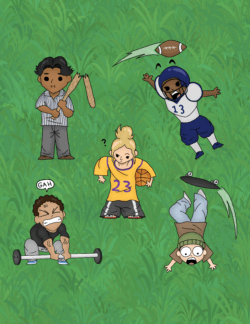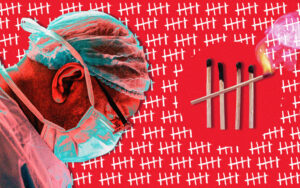Shiny things rust, and—like so many former “gifted kids”—that’s what happened to me.
I’ve been in public schools since second grade, and I always took the hardest classes offered. It wasn’t something my parents and I really needed to discuss—we just knew I would enroll in courses with the highest level of difficulty. To be fair, I kept setting the precedent, advancing year after year with the same A’s I had been earning since the beginning. The topics became increasingly challenging, and I encountered hurdles, but I was pushing myself hard enough to uphold an image of competency. “Principal’s Honor Roll” wasn’t just on my transcript; it was ingrained in my mind. I genuinely loved learning, but I also became addicted to the euphoria of academic validation.
It was in my sophomore year of college, however, that everything came apart. I began experiencing a mental block, if it can be called that. It felt as though my mind was underwater, muffling any and all information I was being taught. If my brain had been a sponge for twelve years, it couldn’t absorb one more drop. Something that should have taken me an hour to memorize was taking me repeated attempts to grasp, and I couldn’t understand why my use of time had become so ineffective. Work smarter, not harder, and I was working so, so hard, with nothing to show for it. I perceived others as 10 steps ahead of me, and I was gasping for air trying to catch up. I wasn’t failing by any means, but being subpar over and over again was silently killing me. I kept wondering if I was devolving into a worse version of myself. How had I gone from feeling relatively in-control to struggling so hard to stay afloat?
What I was suffering from, I later realized, was the textbook definition of gifted kid burnout.
The Mayo Clinic defines burnout as “a state of physical or emotional exhaustion that also involves a sense of reduced accomplishment and loss of personal identity.” “Gifted kid burnout,” however, is an internet term coined by Gen Z in recent years. Plainly put, it refers to students who were placed in advanced-level classes early in their educational careers, only to discover that they can’t maintain the same degree of academic excellence as they get older. They’ve been straight-A students all their life, their personalities slotting perfectly into the spot at the top of the class. But mediocrity crept up on them, until they feel like they have failed their past selves.
And that is exactly how I began to see myself. This skewed self-perception, that my worth was defined by academic performance, is not something that materialized overnight. It had been brewing for years, shaped by my environment and pulled from minor, yet formative, experiences: my high school biology teacher guaranteeing me a 5 on the AP exam, and me getting a 4; my being praised as a perfectionist, as if the need to be exceptional at school wasn’t eating me up inside; a guidance counselor saying my SAT score was a golden ticket to the Ivies (it was not). Comments like these forged a reward system in my head, making me disproportionately attached to perfection and academic validation. I began expecting more and more from myself, and as one journal article explains, “because these personal standards are objectively unreachable, they are associated with the uncomfortable feeling that what has been accomplished is incomplete or imperfect.”
Even now, the “gifted kid” in me has this fear of becoming discardable, of not getting a second glance if my grades and scholarly endeavors aren’t impressive enough. Societal expectations have drained me, and rather than recognizing the pressure put on me in schools, I’ve been blaming myself for “losing sight” of who I used to be; as if being called “gifted” at the age of 7 meant I couldn’t be anything less than perfect for the rest of my life. For many of us “gifted kids,” the constant praise became an ongoing reminder of how we were viewed by peers, parents, and educators alike—as the “golden” child, the teacher’s pet, the top of the class. We began defining ourselves by our academic reputation, until a series of missteps was enough to send us spiraling. I was gifted as a child, but I can’t maintain straight A’s now, so everyone was wrong. Part of the issue is that failure isn’t something we’re familiar with—not because things always come easy to us, but more so because our work tends to pay off, a linear relationship that has never let us down. But then it does, and inevitably, burnout.
There are those who would point out that not all gifted kids experience burnout. Being a gifted kid doesn’t force anyone to be a straight-A student forever. Nevertheless, we have a lot to unlearn, and it will take time to dismantle what we have built ourselves into. I am a product of a world that views failure as shameful, and I refuse to feed into that. A 2019 study found that unhealthy perfectionism is increasing in college students, something that is bound to exacerbate burnout among young adults. We need to endure, though—not as perfect students, but as people who know our mistakes do not retract from our brilliance or self-worth.
I believe the solution to this is two-fold. Internally, we need to restructure our entire mentality about what it means to be “gifted.” In Carrie Soto Is Back, one of my all-time favorite books that tackles perfectionism, Taylor Jenkins Reid muses, “Maybe it’s a lie that you have to keep doing what you have always done. That you have to be able to draw a straight line from how you acted yesterday to how you’ll act tomorrow.” From the minute I read that quote, I let it soak into the recesses of my mind. Maybe I can take a break from putting 110% into everything. Maybe it’s ok that I broke my straight-A streak. I wish I had read that book when I was a senior in high school, dead-set on getting into the Ivies. I wish, as a middle schooler, someone had told me to ingrain that sentiment in my mind, instead of my honor roll distinction. It might have saved me from mounting myself on a pedestal so high I became terrified of falling off.
The second part of the solution is external: Society has to stop setting this trap in the first place. Teachers should be more conscious when making comments about how they “expected more” on a score. How about reminding straight-A students that it is perfectly acceptable to fall short on an assignment? Growth is not linear, and getting 96’s on a normal basis does not make a 79 “out of character.” Gifted kids are not machines who can churn out A’s just because they have been doing it forever; teachers need to vocalize this, to reassure students that excelling in school does not mean suffocating under the pretense of perfection.
Even more, universities need to do a better job of upholding claims of a “holistic” admissions process. Standardized testing is antiquated in nature, and has reached its expiration date. Many experts suggest that such exams are ineffective measures of knowledge, and I wholeheartedly agree. Pushing students to believe that their future hinges on test performance—especially when that test is supposedly representative of an entire country—is detrimentally wrong. Intelligence cannot be gauged by exams alone, and too much of the college application process is contingent on that.
To their credit, schools have begun implementing “mental health days” since the pandemic began—excused absences for students who need a mental, emotional, or psychological break from school. My own county now devotes the third Wednesday of every month to a half-day for mental health. Yet society’s approach to high-achieving students is deep-rooted; it will take much more than mental health days to unravel that. Society needs to begin taking accountability for contributing to the culture of academic pressure we’ve cultivated in schools.
Gifted kids, you are so much more than the expectations hurled at you as a child. You are gifted without the straight A’s, and you deserve to know yourself outside of academic validation.







Let’s not forget about the workplace: it might be acceptable to fall short on an assignment, while still in school, but there are jobs where it just won’t be acceptable to fail a task in any manner, such as in the medical professions. These jobs tend to be more safety-critical, however.
an amazing read! thank you